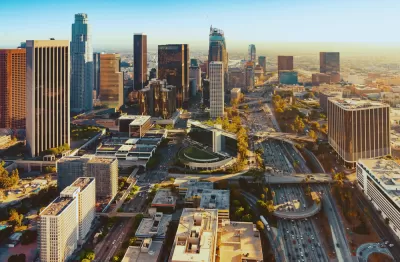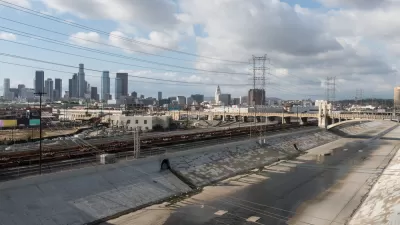A Los Angeles Times editorial explains how political intrigue is spilling over into planning frustration in the city of Los Angeles.

The controversy surrounding the Los Angeles City Council is having a direct impact on one of the city’s most ambitious planning efforts.
In case you missed the bombshell L.A. politics story at the end of 2022, several city councilmembers were caught on a leaked tape making racist remarks about fellow councilmembers and their family members. Then-Council President Nury Martinez resigned her position as a result of the controversy, former Councilmember Gil Cedillo was already a lame duck at the time of the leak, and current Councilmember Kevin de León is holding onto his seat despite calls for his resignation, protests at City Council meetings, and a violent altercation with an advocate at a holiday party at the end of 2022.
According to a recent L.A. Times editorial, however, the Downtown Community Plan (DTLA 2040), an early test for the city’s new zoning code, is collateral damage in the ensuing controversy.
“On development matters, the City Council generally defers to the council member who represents the area. And with the two men going into hiding after the scandal, the council’s Planning and Land-Use Committee put the plan on hold,” according to the editorial.
While this specific issue is problematic, according to the editorial, it’s also indicative of a larger challenge with the political culture surrounding planning and development. The editorial references the hiccups by the city in meeting the requirements of the state-mandated Regional Housing Needs Assessment process in 2022.
Council members treat their districts like fiefdoms in which they have complete control over land-use decisions. But that deference is now slowing the city’s much-needed effort to modernize its land-use rules and plan for 455,000 new homes, including 185,000 affordable units by 2029 to meet state requirements.
The editorial also notes that the Downtown Plan is a huge component of the city’s plan to deal with its homelessness and housing affordability crises. The political intrigue caused by a few councilmembers is slowing down on the pressing needs for more, affordable, high-quality housing in a city defined by overcrowded housing and the highest population of people experiencing homelessness anywhere in the country.
The clock is ticking, now, too:
If the City Council doesn’t act on the Downtown and Hollywood plans by May, the documents will expire and the Planning Department will have to restart the approval process, which could delay the plans by as much as a year. And, because the Downtown and Hollywood plans have dragged on for so many years, the Planning Department hasn’t been able to accelerate work on the next round of community plans.

Planetizen Federal Action Tracker
A weekly monitor of how Trump’s orders and actions are impacting planners and planning in America.

Maui's Vacation Rental Debate Turns Ugly
Verbal attacks, misinformation campaigns and fistfights plague a high-stakes debate to convert thousands of vacation rentals into long-term housing.

Restaurant Patios Were a Pandemic Win — Why Were They so Hard to Keep?
Social distancing requirements and changes in travel patterns prompted cities to pilot new uses for street and sidewalk space. Then it got complicated.

In California Battle of Housing vs. Environment, Housing Just Won
A new state law significantly limits the power of CEQA, an environmental review law that served as a powerful tool for blocking new development.

Boulder Eliminates Parking Minimums Citywide
Officials estimate the cost of building a single underground parking space at up to $100,000.

Orange County, Florida Adopts Largest US “Sprawl Repair” Code
The ‘Orange Code’ seeks to rectify decades of sprawl-inducing, car-oriented development.
Urban Design for Planners 1: Software Tools
This six-course series explores essential urban design concepts using open source software and equips planners with the tools they need to participate fully in the urban design process.
Planning for Universal Design
Learn the tools for implementing Universal Design in planning regulations.
Heyer Gruel & Associates PA
JM Goldson LLC
Custer County Colorado
City of Camden Redevelopment Agency
City of Astoria
Transportation Research & Education Center (TREC) at Portland State University
Jefferson Parish Government
Camden Redevelopment Agency
City of Claremont





























